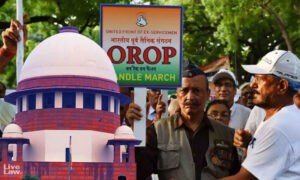Testimony Of Disabled Witness Cannot Be Considered Week Or Inferior: SC Issues Guidelines To Make Criminal Justice System More Disabled-friendly
Case: Patan Jamal Vali vs. State of Andhra Pradesh
Coram: Justices DY Chandrachud and MR Shah
Case No: [CrA 452 of 2021]
Court Observation: “One such instance is the judgment of this Court in Mange v. State of Haryana, where the testimony of a thirteen-year-old girl who was deaf and mute was not recorded and the conviction was confirmed on the account of an eye witness and supported by medical evidence. This Court in affirming the conviction noted that the non-examination of the prosecutrix was not a major infirmity in the prosecution’s case “apart from being a child witness, she was also deaf and dumb and no useful purpose would have been served by examining her.”
We are of the considered view that presumptions of such nature which construe disability as an incapacity to participate in the legal process reflect not only an inadequate understanding of how disability operates but may also result in a miscarriage of justice through a devaluation of crucial testimonies given by persons with disabilities. The legal personhood of persons with disabilities cannot be premised on societal stereotypes of their supposed “inferiority”, which is an affront to their dignity and a negation of the principle of equality…
…This kind of a judicial attitude stems from and perpetuates the underlying bias and stereotypes against persons with disabilities. We are of the view that the testimony of a prosecutrix with a disability, or of a disabled witness for that matter, cannot be considered weak or inferior, only because such an individual interacts with the world in a different manner, vis-à-vis their able-bodied counterparts.
As long as the testimony of such a witness otherwise meets the criteria for inspiring judicial confidence, it is entitled to full legal weight. It goes without saying that the court appreciating such testimony needs to be attentive to the fact that the witness’ disability can have the consequence of the testimony being rendered in a different form, relative to that of an able-bodied witness. In the case at hand, for instance, PW2’s blindness meant that she had no visual contact with the world. Her primary mode of identifying those around her, therefore, is by the sound of their voice. And so PW2’s testimony is entitled to equal weight as that of a prosecutrix who would have been able to visually identify the appellant.”
[doc id=4822]
Previous Posts
Power Under Section 482 CrPC Cannot Be Used To Undermine Statutory Dictate Under Section 14, 17 IBC
Indian Parties Can Choose A Foreign Seat For Arbitration
‘High Courts Are In A Crisis Situation’: Supreme Court Lays Down Time Line For Appointment Of High Court Judges Download Judgement




